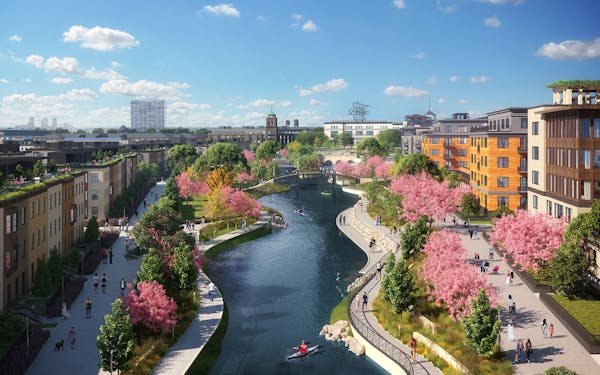The St. Paul Planning Commission on Friday narrowly rejected a $60 million housing development proposed for a long-vacant lot a mile east of Allianz Field. Several commissioners and housing advocates worry the project not only is too expensive for most area residents to rent, but that it will drive up rents and taxes in nearby neighborhoods desperate for low-cost housing.
"I think the long-term effects of this development will negatively affect the community more than any positive impact it might have," said Adrian Perryman, one of eight commission members to vote against the project's site plan. He said projects that promote "equity, sustainability and affordability" to a wide range of residents are a focus of the Planning Commission and of the city's Comprehensive Plan.
The commission's 8-7 vote rejecting the development also went against the recommendation of staff members of the city's Planning and Economic Development Department.
Chris Osmundson, director of development for Alatus, said the Minneapolis-based developer of the 288-unit project will appeal to the St. Paul City Council. He said the commission overstepped its authority by using affordability as a reason to deny.
"It is very disappointing and sets a dangerous precedent for future development in the City of St. Paul," Osmundson said in an e-mail. "It will only further compound the housing crisis if the Planning Commission continues to act as an elected, policymaking body."
In a city with little open space and a need for housing, a proposal for a 2-acre parcel owned by the Amherst H. Wilder Foundation initially sparked excitement. But Alatus, a developer known for building luxury housing, quickly encountered pushback from area residents and advocates who fear it will accelerate gentrification and displacement in nearby Frogtown — one of St. Paul's poorest neighborhoods.
Caty Royce, co-director of the Frogtown Neighborhood Association, said the Planning Commission's vote is consistent with the city's Comprehensive Plan — and the City Council should follow suit.
"The city doesn't need luxury housing next to the old Rondo neighborhood," she said. "It will have a disastrous impact on an already gentrifying neighborhood."
Royce and others have criticized Wilder for not demanding more affordable units. One of Alatus' plans would make up to a dozen apartments affordable for families making 40 to 60% of area median income. According to a report by the Minnesota Housing Partnership, Twin Cities-area median income in 2016 was more than $85,000 for a family of four. In St. Paul, it was just over $64,000. And in Frogtown, median income is less than $40,000, according to Minnesota Compass.
Wilder, a St. Paul-based philanthropic organization that fights the effects of poverty, had planned to close the sale nearly a year ago, but it extended the agreement as local officials worked to make the project more affordable to people with even lower incomes.
The purchase agreement has been extended since then. On Friday, Wilder President and CEO Armando Camacho said in a statement that "We will continue to monitor the process as it moves forward."
James Walsh • 612-673-7428
New Minnesota GOP leaders seek peace with party's anti-establishment wing

Who is Republican Lisa Demuth, Minnesota's first House speaker of color?

Minnesota House GOP, Secretary of State Steve Simon return to Supreme Court
Supreme Court sides with DFL and Simon, says 68 House members needed for floor action

